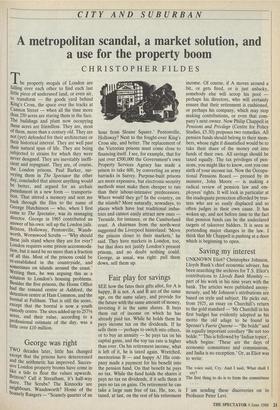Fair play for savings
SEE how the fates their gifts allot, for A is happy, B is not. A and B are of the same age, on the same salary, and provide for the future with the same amount of money, investing it in the same shares. B buys them out of income on which he has already paid tax. While he holds them he pays income tax on the dividends. If he sells them — perhaps to switch into others, or to buy an annuity — he pays tax on his capital gains, and the top tax rate is higher than ever. On his retirement income, what is left of it, he is taxed again. Wretched, meritorious B — and happy A! His com- pany made a payment for his benefit into the pension fund. On that benefit he pays no tax. While the fund holds the shares it pays no tax on dividends, if it sells them it pays no tax on gains. On retirement he can take a large sum free of tax. He, too, is taxed, at last, on the rest of his retirement income. Of course, if A moves around a bit, or gets fired, or is just unlucky, somebody else will scoop his pool — perhaps his directors, who will certainly ensure that their retirement is cushioned, or perhaps his company, which may stop making contributions, or even that com- pany's next owner. Now Philip Chappell in Pensions and Privilege (Centre for Policy Studies, £5.50) proposes two remedies. All pension funds should belong to their mem- bers, whose right if dissatisfied would be to take their share of the money out into funds of their own. All savings should be taxed equally. The tax privileges of pen- sions, you might like to know, cost you one sixth of your income tax. Now the Occupa- tional Pensions Board — pressed by its minister, John Moore — is making a radical review of pension law and em- ployees' rights. It will look in particular at the inadequate protection afforded by trus- tees who are so easily displaced and so often judges in their own cause. It has woken up, and not before time to the fact that pension funds can be the undeclared targets of takeover bidders. It is seen as portending major changes in the law. I think that Mr Chappell is pushing at a door which is beginning to open.


















































 Previous page
Previous page